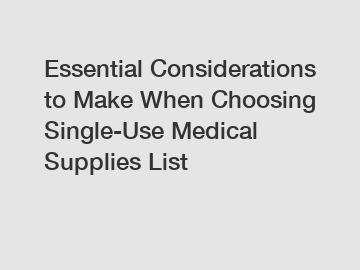HCV and HBsAg: Understanding Liver Infection Markers
HCV and HBsAg: Understanding Liver Infection Markers
Liver health is crucial for overall well-being, and understanding the markers associated with liver infections can empower individuals to make informed health decisions. Among these markers, HCV (Hepatitis C Virus) and HBsAg (Hepatitis B Surface Antigen) play significant roles in diagnosing and managing liver diseases. This blog post aims to clarify the importance of these markers, how they are tested, and what their presence indicates about one's liver health.
Are you interested in learning more about hcv hbsag? Contact us today to secure an expert consultation!
What is HCV?
HCV, or Hepatitis C Virus, is primarily transmitted through blood and can lead to chronic liver disease. Once infected, an individual might show no symptoms for years, making regular screening essential, especially for those at higher risk such as individuals with a history of intravenous drug use or those who received blood transfusions before the early 1990s. When testing for HCV, healthcare providers usually start with an antibody test to determine if your body has developed antibodies against the virus.
If the antibody test comes back positive, it indicates a possible current or past HCV infection. Follow-up tests, including a PCR (Polymerase Chain Reaction) test, are necessary to detect the virus's presence and see if the infection is active. Recognizing these markers plays a crucial role in managing liver health and preventing progression to serious liver disease.
Understanding HBsAg
On the other hand, HBsAg, or Hepatitis B Surface Antigen, is a marker used to identify an active Hepatitis B infection. Detecting this antigen in the blood means that a person is currently infected with the Hepatitis B virus, which can either be acute or chronic. The presence of HBsAg indicates that the virus is replicating, which poses a risk not only to the individual but also to others through transmission routes similar to HCV.
Testing for HBsAg usually involves a simple blood test, and it is recommended for individuals who may have been exposed to Hepatitis B or who are at risk. Regular monitoring is vital as chronic Hepatitis B infections can lead to severe liver issues, including cirrhosis and liver cancer. Understanding the implications of HBsAg can be a game-changer in the early intervention and management of liver infections.
The Connection Between HCV and HBsAg
While HCV and HBsAg serve different functions in diagnosing liver infections, they complement each other in understanding a patient’s overall liver health. Individuals can be co-infected with both viruses, increasing the complexity of treatment and management. As such, routine testing for both HCV and HBsAg is critical for anyone at risk of liver disease.
Explore more:7 Essential Benefits of Using a Skin Tester Analyzer for Your Skincare
How to Choose the Best Plasters for Wounds: A Complete Guide
Stapler Suture Removal: Essential Guide for 2024
Why Does Punch Biopsy Forceps Cost Vary?
Key Considerations for Buying Reusable Mini Biopsy Forceps
Effective 808nm Diode Laser Hair Removal: Benefits & Methods
How Can Body Contouring Equipment Address Your Unique Body Goals?
Health professionals often emphasize the importance of early detection and treatment. The presence of either marker indicates the need for further evaluation and potential intervention. Patients with detectable HCV or HBsAg markers may require antiviral therapies, and identifying these conditions early can prevent irreversible liver damage.
Moving Forward: Diagnosis and Treatment
If you suspect you may be at risk for Hepatitis C or B, don’t hesitate to consult with your healthcare provider about getting tested for these liver infection markers. Early diagnosis not only leads to increased treatment options but can also significantly reduce the risk of severe long-term health issues.
Moreover, advancements in treatment for HCV and innovative management strategies for chronic Hepatitis B have greatly improved patient outcomes. Newer antiviral medications can help achieve viral suppression and lead to a higher quality of life for those infected.
Summary: The Importance of Monitoring HCV and HBsAg
In summary, understanding the roles of HCV and HBsAg as liver infection markers is essential for anyone concerned about liver health. Regular testing can lead to early detection, paving the way for effective treatment and management. If you’re interested in further exploring how these markers impact liver health or wish to learn more about potential treatment options, we encourage you to reach out to your healthcare provider or follow the links in this article for more information.
Are you aware of your liver health status? Understanding your HCV and HBsAg results can be a crucial step in preventing liver disease. Don’t wait—take charge of your health today!
Contact us to discuss your requirements of psa serum or plasma. Our experienced sales team can help you identify the options that best suit your needs.
Explore more:Reduce Costs, Boost Efficiency: Unleashing the Power of Reductes in Today's Market
Key Benefits of MBT Technology for Global Industries
Unlock Youthful Skin with HIFU SMAS Lifting
how long should you wait to shower after laser hair removal
Double-Crank Manual Hospital Bed vs Electric: What's Best?
Key Questions to Ask When Choosing a Hospital Bed for Your Baby
How to Choose the Perfect Hospital Bed for Your Baby?










